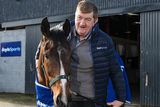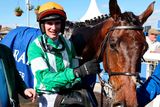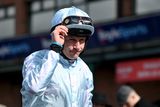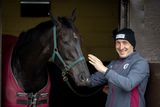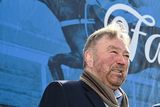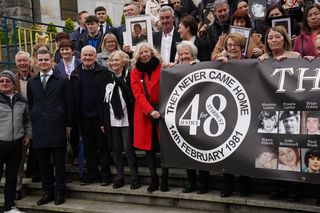'But how can you compare anything to Golden Cygnet'
Ireland's finest novice hurdlers will always live in the shadow of the one that got away, writes John O'Brien
I T started with Hurricane Fly and reached a crescendo with Dunguib. It wasn't what they had achieved but the mere suggestion of how far they could go. It was how they travelled through their races, the way they toyed with their opponents; the beautiful, unmistakable stamp of class. Those with longer memories were instantly transported back to a sweet, magical time and a rare gem called Golden Cygnet.
The spring of 1978. Eddie O'Grady was 28 years old, already a winning trainer at the Cheltenham Festival and about to burnish his reputation further. O'Grady had bought Golden Cygnet three years earlier as an unbroken three-year-old at the Goffs sales for 980 guineas. It seemed cheap until he had contested that year's Supreme Novices Hurdle. Afterwards O'Grady knew he had got the bargain of the century.
Strange thing: O'Grady doesn't remember travelling to Cheltenham supremely confident. That Golden Cygnet went off a prohibitive 4/5 favourite suggested defeat was out of the question, but that's not how the trainer saw it. He knew Fred Rimell was bullish about his highly-promising novice, Western Rose. Rimell was leading trainer at the Festival at the time, undaunted by the reputation of the horse crossing the Irish Sea.
Four months earlier, Golden Cygnet had contested the November Handicap at Leopardstown. He had been backed from 20/1 to 7/2 and, in O'Grady's eyes, was a moral certainty. Ridden by an English lightweight jockey Richard Fox, however, Golden Cygnet failed to settle and finished a disappointing seventh. The best-laid plans, O'Grady realised, could still go awry.
Cheltenham presented no hitches, though. The "freak", as his jockey Niall 'Boots' Madden calls him, bided his time until they reached the second-last hurdle before stretching home 15 lengths clear of Western Rose. "He didn't beat Western Rose," Madden says. "He pulverised him." Ted Walsh watched the race unfold in the jockeys' room. "Western Rose was a very good horse," he says, "but Golden Cygnet made him look like a ginnet."
If he wasn't a freak, Golden Cygnet wasn't normal either. "He was a funny horse," says O'Grady. "The further most horses go in a race the more they come off the bridle, the less they pull. When he jumped off at the back of the field, he wouldn't pull. But the further he moved through the field, the more he started to pull. Exactly the opposite to a normal horse."
The race still plays out vividly in his mind's eye. Golden Cygnet switching to his right at the third last, seeing daylight for the first time. "Boots swinging off him. Nearly sawing him left to right. Do you know they had to get a new camera angle that day? They couldn't get him and the rest of the field into the same camera angle. Cameras were less sophisticated in those days."
The racing world was astonished. "I've never seen a horse win so easily at the Festival," said Rimell, magnanimous in defeat. Vincent O'Brien declared Golden Cygnet "the best hurdler I've ever seen." O'Grady saw the future stretching out before him: "Three or four Champion Hurdles." It was the golden age of hurdling, but such ambition still seemed entirely plausible.
Less than four weeks later, Golden Cygnet was dead, undone by a last-flight fall in the Scottish Champion Hurdle at Ayr, a race that had not initially been part of the trainer's plans. The notion had been floated to O'Grady at the Aintree meeting two weeks' previously and, after consulting Golden Cygnet's owner Ray Rooney, they decided it was worth the trip.
If you're still uncertain about Golden Cygnet's greatness, consider this. As a handicap race he was allotted 11st 13lb, just a pound lighter than Sea Pigeon and five pounds more than Night Nurse which, between them, would account for four Champion Hurdle victories at Cheltenham. A novice not just proving himself capable in such exalted company but ready to assert his dominance, just one hurdle barring the way to another memorable triumph.
"I was cantering on him," remembers Madden. "Still cruising. He had jumped brilliantly, never touched a hurdle. And then for some reason he stood off a bit too far at the last and he just clipped the top of it and came down on his neck. We were going so fast I knew it was a bad fall."
In the end, Sea Pigeon swooped late to beat Night Nurse, but the real drama was playing elsewhere. A cheer had gone up when, after a delay, Golden Cygnet rose gingerly to his feet and walked back to the stables, shaken but not, it seemed, fatally so. Later O'Grady comforted him in his box. The lump on Golden Cygnet's neck was alarming, but didn't suggest an imminent threat to his life.
Something about the horse stoked O'Grady's anxiety, though. He summoned the racecourse vet and, together, they decided to send him to the Royal Veterinary College in Edinburgh. It was purely a cautionary measure. O'Grady left for Tipperary knowing his horse was in the best possible care.
Still, it wasn't enough. On the Monday, two days after the race, the bulletins from Edinburgh remained positive and O'Grady had gone racing in Kilbeggan. He reached home after 10 that night, tired and stressed. Still the horse was okay and nothing else mattered. He had settled down to his supper when the phone rang. Golden Cygnet had suffered a brain haemorrhage as a result of an injured vertebrae and had been humanely destroyed.
Trainers lose horses all the time, of course, but not of the calibre of Golden Cygnet and not in the same, trying circumstances. For two days they'd entertained false hope and that shattered him. "It was devastating," he says. "Absolutely devastating. Rather like a friend or part of the family not only dying unexpectedly, but in a different country. That was the hardest part."
And now, 32 years later, Dunguib will line up as the first odds-on favourite for the Supreme Novices Hurdle since then and the comparisons are irresistible. People see something of O'Grady's horse in Dunguib's running style. It is true too that, as young horses, both proved difficult to handle. Dunguib was tough to break and O'Grady remembers days when Golden Cygnet would buck his lad off "two or three times" before finally agreeing to settle.
Yet the similarities can only go so far. "I've had people ring me up, asking me to compare them," says Madden, "but how can you compare anything to Golden Cygnet? He was a freak, a one-off. I don't care how long I'd be in the game, I'd never ride another like him. Dunguib is very good but he has to go and do it yet."
"People will always compare," says O'Grady. "It's human nature. Dunguib does seem a phenomenal talent, but there are questions about his jumping. Right now his talent and his jumping aren't matching. If they do then beware."
Instead, he reaches outside the sport for the most appropriate comparison. "It's a bit like James Dean isn't it? A guy who was a phenomenal youngster, nipped in his prime and becomes, what's the word, iconic. As a racehorse he's in the James Dean mould."
It is more apposite than he realises. Dean made seven movies. Golden Cygnet ran seven times over hurdles. Two dreadfully short careers but enough to frame two enduring legends.

